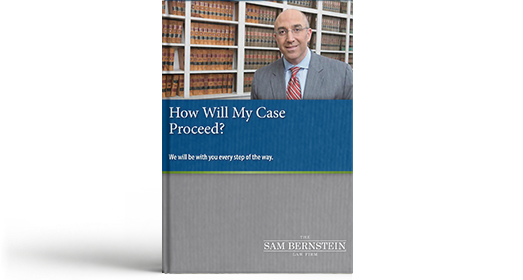HEAD AND BRAIN INJURY LAWYERS
If you've experienced a severe head or brain injury, be sure to contact The Sam Bernstein Law Firm to get the compensation you deserve.
MICHIGAN BRAIN INJURY LAWYER
Traumatic injuries to the head can damage the delicate tissue of the brain.
Even if the full damage is not visible, brain injuries are often serious and life-altering. If you or a loved one have suffered a brain injury due to someone else’s negligent actions, you should consider bringing a personal injury case to get compensation. If you decide to file a personal injury case, you will need a brain injury lawyer to help you get the compensation you or your loved one deserves.
We are Michigan's most experienced personal injury law firm with over 800 years of combined legal experience. Contact us today for a free consultation with our team of brain injury attorneys!
SYMPTOMS OF TRAUMATIC BRAIN INJURY
The symptoms of traumatic brain injury vary widely, depending upon the type and extent of the injury. Certain symptoms are associated with minor traumatic brain injuries. These signs and symptoms include:
- A headache
- Dizziness or a loss of balance
- Nausea
- Vomiting
- Drowsiness or fatigue
- Problems with speech
- A short period of a loss of consciousness
- Difficulty sleeping or sleeping more than usual
- Blurred vision
- Sensitivity to light and/or sound
Some traumatic brain injuries can be extremely serious with severe, lasting consequences. The symptoms of a more serious brain injury include the following:
- Dilation of one or both pupils
- Inability to wake up from sleep
- Loss of coordination
- Leaking of clear fluids from the ears or nose
- Seizures or convulsions
- Numbness or weakness in the toes and fingers
- An extended period of loss of consciousness – lasting from several minutes to hours
- A persistent headache or a headache that rapidly becomes worse
- Slurred speech
- Coma
COMMON CAUSES OF TRAUMATIC BRAIN INJURY
Traumatic brain injuries often occur as a result of a violent blow or a significant jolt to the body or head. Traumatic injuries to the brain can also occur when an object strikes the head and penetrates the brain tissue, such as when the head is struck by a bullet that pierces the brain tissue.
The most common causes of traumatic head injuries include motor vehicle accidents and falls. Brain injuries can happen in car accidents, even minor ones, due to the impact of the vehicle striking the other vehicle. A common minor brain injury due to a car accident is whiplash. Whiplash is often resolved after a few weeks.
Falls tend to be more common with elderly individuals and children. If you have suffered a traumatic brain injury as a result of a fall, you may have a personal injury claim against the owner of the property on which the fall occurred.
Another slightly less common cause of brain injury is athletic activity. Certain sports tend to result in brain injuries to the players. These sports include soccer, football, lacrosse, and hockey. Whether or not it is possible to succeed with a personal injury claim, due to sport-related traumatic brain injuries, is very dependent on the facts of the case.
TRAUMATIC BRAIN INJURIES–VARYING DEGREES OF SEVERITY
There are different degrees of seriousness when it comes to traumatic brain injuries. You may have a mild brain injury that occurs and affects your brain cells on a temporary basis that is then resolved fairly quickly, such as bruising. In other cases, more serious brain injuries can result in torn brain tissue, bleeding, and other forms of physical damage to the brain. Serious traumatic brain injuries can end up resulting in major long-term complications, or even death.
If you or a loved one has suffered a brain injury, contact us as soon as possible to get in touch with a brain injury lawyer.
MORE INFORMATION ON HEAD OR BRAIN INJURIES:
TYPES AND SYMPTOMS OF BRAIN INJURIES
TWO TYPES OF BRAIN INJURY
Often, traumatic brain injuries are classified into two categories: penetrating head injury and closed head injury.
A penetrating head injury, or open wound, is visible and involves an actual penetration of the skull and brain tissue.
A closed head injury is the more common type of traumatic brain injury. These vary widely in severity. For example, a minor concussion is a form of closed head injury. On the other end of the spectrum, a closed head injury can result in complete disability, loss of physical function and cognitive ability, or even death.
SYMPTOMS OF A BRAIN INJURY
Sometimes the symptoms of a profound head injury are not immediately apparent. However, there are recognized symptoms of brain damage. Signs of closed head injury include unconsciousness at the accident site, a coma, or seizure(s). If an individual sustains any injury to the head, it is important to seek immediate medical attention.
When a person’s head is struck or jarred in an accident, be on the lookout for headaches, nausea, confusion, or other problems with concentration or memory.
Personality changes also may signal a traumatic brain injury. The injured person might become unusually irritable, angry, or depressed. Family, friends, and co-workers may notice these changes, while the injured person does not. Once again, prompt medical attention is very important for a suspected injury.
If you or a loved one has suffered a brain injury, contact Michigan's most experienced personal injury law firm as soon as possible.
THE GLASGOW COMA SCALE
The outcome of a traumatic brain injury varies greatly, depending on its severity. A treating physician often uses the Glasgow Coma Scale to assess the extent of the damage.
The Glasgow Coma Scale measures a closed head injury victim’s ability to open his or her eyes, provide verbal responses, and provide motor responses. The scale ranges between a score of three to fifteen. The higher the score, the better the overall prognosis.
For more information please visit the Center for Disease Control’s page on the Glasgow Coma Scale.
Client reviews

"THEY KEPT ME UPDATED."
- Veronica, Actual Client

"I WILL BE FOREVER GRATEFUL."
- Tim, Actual Client

"I FELT LIKE I WAS A PART OF THE FAMILY"
- Terrence, Actual Client

"VERY PROFESSIONAL & KNOWLEDGEABLE"
- Sherry, Actual Client

"PASSIONATE, COMPETENT, COMMITTED"
- Actual Client

"THEY STAND BY THEIR WORD."
- Actual Client

"KIND & COMPASSIONATE"
- Nancy, Actual Client

"YOU CAN TRUST THEM 100%."
- Michael, Actual Client

"HONEST, CARING, SUPPORTIVE."
- Janice, Actual Client

"THEY TOOK PERSONAL INTEREST IN ME."
- Janice, Actual Client

"I KNEW I WAS IN GOOD HANDS"
- Jerry, Actual Client

"NUMBER ONE PERSON I'D RECOMMEND."
- Actual Client

"SAM'S GOT YOU COVERED."
- Chris, Actual Client
RECOMMENDED READING

Why Serious Injury Lawyers Are Important for You a...
UPDATE: Michigan Slip & Fall Law has changed. The inform Read more…
May 12, 2020

10 Questions to Ask a Head Injury Lawyer...
UPDATE: Michigan’s New No-Fault Law went into effect July Read more…
April 13, 2020

The Best Children’s Hospitals in Michigan...
Few things are more distressing to a parent than being told Read more…
August 12, 2019

What Are Your Rights as a Patient?...
When you are admitted to a hospital or move into a nursing h Read more…



